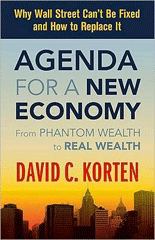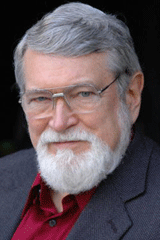Replacing Wall Street
Air Date: Week of April 17, 2009

Author David Korten has a vision for a world run not by financial speculation but by "real" wealth-- anything that contributes to a healthy planet and happy communities. He talks with host Steve Curwood about how Wall Street creates and controls wealth. His new book is "Agenda for a New Economy: From Phantom Wealth to Real Wealth."
Transcript
YOUNG: It’s Living on Earth, I’m Jeff Young.
CURWOOD: And I’m Steve Curwood.
The recession has meant a lot of things for a lot of people--lost jobs, lost investments, lost houses, lost sleep.
And for author David Korten, our current economic mess may also generate public support for fundamental changes in our economic system. His new book is called, "Agenda for a New Economy: From Phantom Wealth to Real Wealth: Why Wall Street Can’t Be Fixed and How to Replace it."
David Korten, what is the difference between what you call real and phantom wealth?
KORTEN: Phantom wealth is basically money that is created out of nothing. And Wall Street has become a master at phantom wealth creation.
CURWOOD: For example?
KORTEN: Well, pumping up financial bubbles. Of course, the whole mortgage debacle was based on the assumption that housing prices would rise forever and, of course, housing prices were rising even though there was no change in the size of the home and its state of repair, its livability, its location or anything else. It was pure inflation. But we treated that as though inflating housing prices was actually creating real wealth.
CURWOOD: And what is real wealth?
KORTEN: Well real wealth is anything of real value or utility. It can be land, labor, education, ideas. And at the most basic level it’s healthy children, it’s a strong family, it’s a healthy natural environment. The most valuable of real wealth is living wealth. But of course that does not come in in any way in the statistics by which we normally evaluate economic performance.

Author David Korten.
KORTEN: Yes, in our current system the creation of money is controlled by private banks. And it’s created when a bank issues a loan. It records the loan as a liability and makes another entry as an asset, which represents the money you need to repay. And with those simple entries, new money is created. Now the catch is that the bank creates only the amount of the principle, but you have to repay the principle plus interest, which means that in the aggregate, if the economy is not growing fast enough to generate enough demand for new loans to create the money to repay the interest, then the whole system goes into default, which is very much what has happened.
CURWOOD: So, wait a second, you’re saying that our banking system is essentially a Ponzi scheme.
KORTEN: It is very much a Ponzi scheme. And it’s a very sophisticated Ponzi scheme, but it puts the whole society into a condition of dependence and debt slavery such that we all end up working for the banks in the end.
CURWOOD: Now the folks who talk about a free market often cite Adam Smith. In your book, you also turn to Adam Smith. Seems that you and the folks that you don’t agree with are citing the same guru.
KORTEN: We are. And it’s interesting how, you know, many of our historic thought leaders have been distorted. Now, if one really understands Adam Smith – he was actually praising a market that looks very much like a local farmers market: a place where small producers and consumers come together in the context of a community and community values to exchange goods and services. Now what his writing has been used to justify is the consolidation and monopolization of economic power and, in fact, those who study Adam Smith’s work in depth conclude that he actually wrote “Wealth of Nations” as almost a tirade against the concentration and abuse of corporate power with the support of the state.
CURWOOD: How does the climate change crisis play into your thesis here?
KORTEN: What we need to face up to is that as a species we are exceedingly over consuming beyond what the planet can sustain. Now, we’re often told that any change in our consumption level will require sacrifice. There are enormous opportunities to at once reduce our consumption and increase our quality of life. But it requires an enormous reallocation of resources from those uses that are harmful, like warfare is an obvious example or the creation of an auto-dependent society, to a focus on meeting real needs and meeting the real needs of all people. Now, this requires almost literally standing our economy on its head to focus on life needs rather than on increasing the financial assets of the already very wealthy.
CURWOOD: Please describe for me, David Korten, the way a healthy economy from your perspective would operate, one that would in fact protect the environment and support our society. In other words, what should we replace Wall Street with?

CURWOOD: David Korten is president and founder of the People-Centered Development Forum, and author of "Agenda for a New Economy: From Phantom Wealth to Real Wealth, Why Wall Street Can't Be Fixed and How to Replace It."
Links
Living on Earth wants to hear from you!
Living on Earth
62 Calef Highway, Suite 212
Lee, NH 03861
Telephone: 617-287-4121
E-mail: comments@loe.org
Newsletter [Click here]
Donate to Living on Earth!
Living on Earth is an independent media program and relies entirely on contributions from listeners and institutions supporting public service. Please donate now to preserve an independent environmental voice.
NewsletterLiving on Earth offers a weekly delivery of the show's rundown to your mailbox. Sign up for our newsletter today!
 Sailors For The Sea: Be the change you want to sea.
Sailors For The Sea: Be the change you want to sea.
 The Grantham Foundation for the Protection of the Environment: Committed to protecting and improving the health of the global environment.
The Grantham Foundation for the Protection of the Environment: Committed to protecting and improving the health of the global environment.
 Contribute to Living on Earth and receive, as our gift to you, an archival print of one of Mark Seth Lender's extraordinary wildlife photographs. Follow the link to see Mark's current collection of photographs.
Contribute to Living on Earth and receive, as our gift to you, an archival print of one of Mark Seth Lender's extraordinary wildlife photographs. Follow the link to see Mark's current collection of photographs.
 Buy a signed copy of Mark Seth Lender's book Smeagull the Seagull & support Living on Earth
Buy a signed copy of Mark Seth Lender's book Smeagull the Seagull & support Living on Earth

